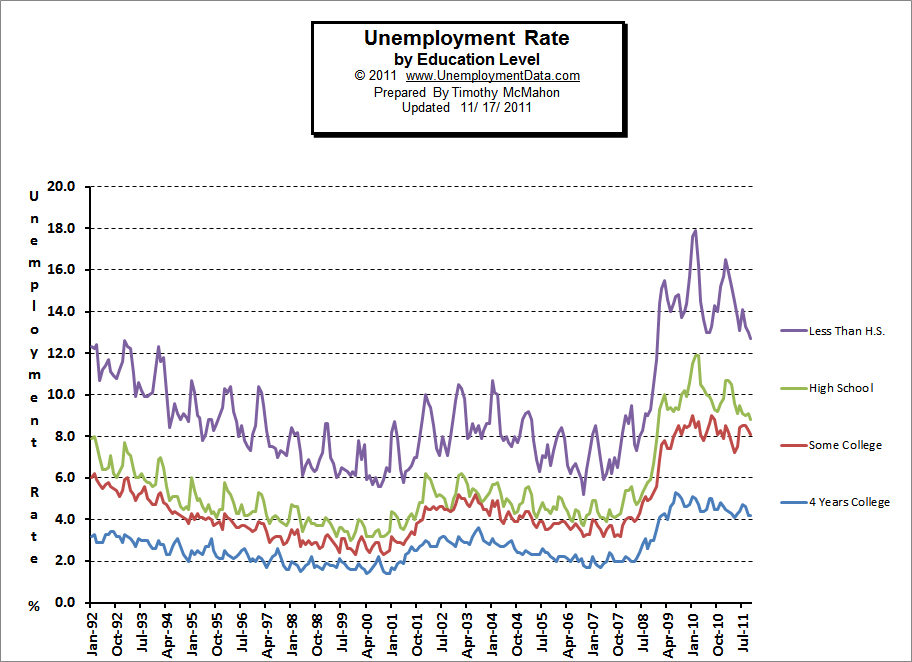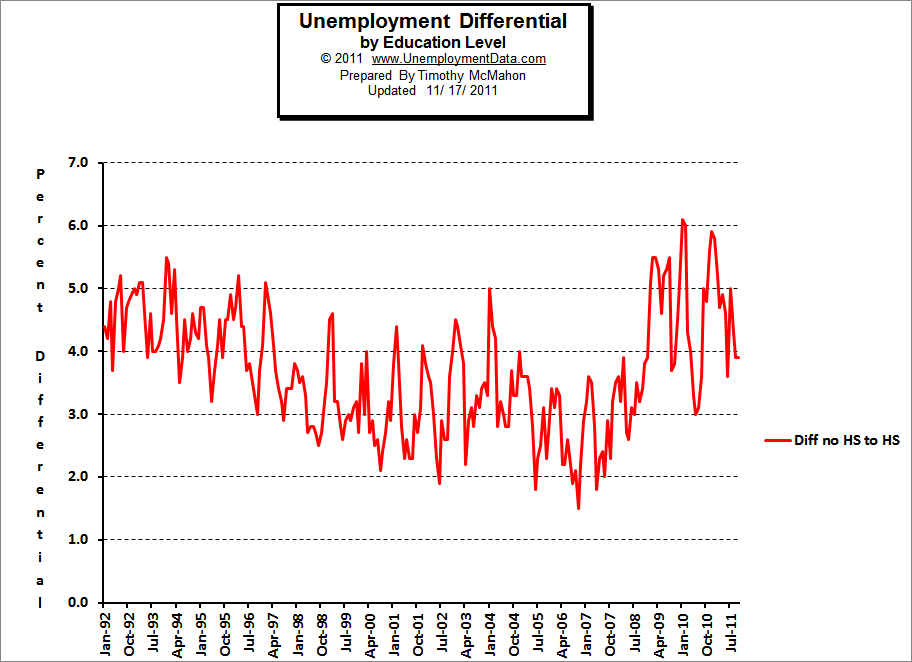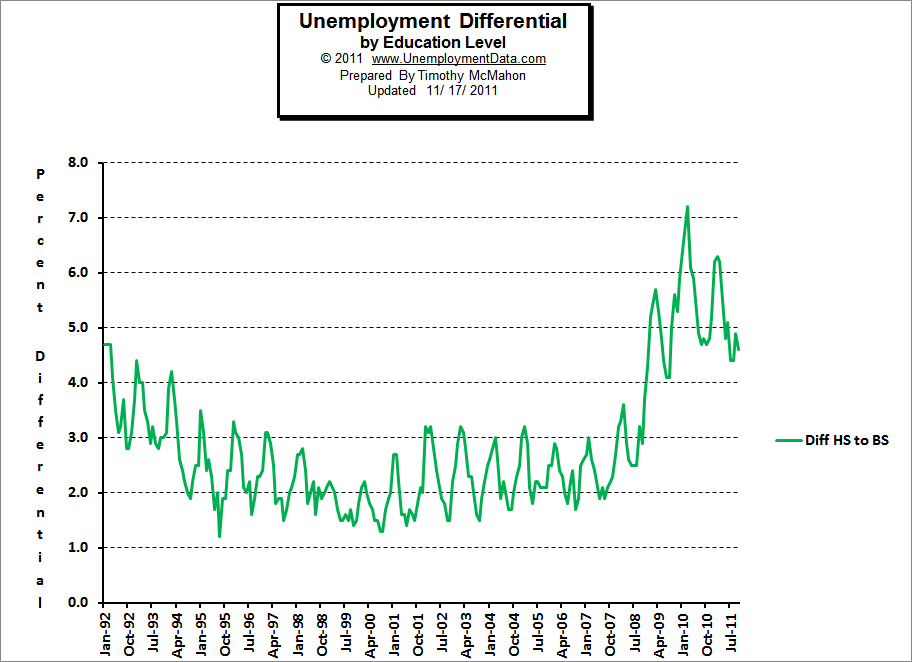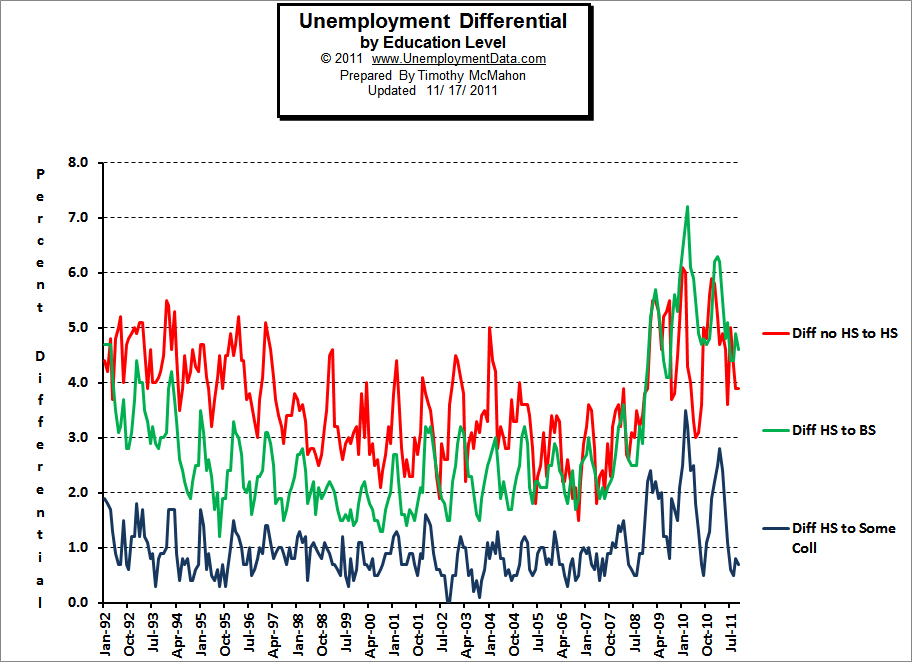The Difference a College Degree Makes
We’re always told by our parents that we need a good education in order to get a good job. And that we will make more money if we have a good education. But these days we hear of unemployed college graduates camping out in New York city and protesting Wall Street because they can’t find jobs. So let’s take a look at the numbers and compare the unemployment rate based on eduation level. In the following chart we will look at four educational levels. The first level are those people with less than a High School education. The second level are those with a High School diploma. The third level are those with some college education or an associates degree. And finally those with a Four Year College Degree.

As we can see from the chart above, obviously the unemployment rate is the highest for those with the least education… as we would expect. Logically if you were an employer you would lay off the least educated employees first because they are more readily replaceable. We can even tell by the numbers the actual difference a high school education makes. The average unemployment rate for the period from 1992 through October 2011 for High School graduates was 5.5% while the average for those who didn’t graduate from High School was 9.2%. So simply by getting a High School education, you decreased your odds of being unemployed drastically with the actual difference being 3.7%. But if you look at the chart you will see that a High School education was even more valuable than that. The real benefit of being able to get a job is when jobs are scarce, so even though the average difference was 3.7% during bad times, i.e. when the overall unemployment rate is higher the difference climbs even more.
First, let’s look at the difference just a high school education makes.
High School Education

As we can see the differential is relatively low when times are good such as January 2007. At that point, the overall unemployment rate was 4.6% and the differential between having a HS diploma and not was only about 1%. But as times got tougher and the overall unemployment rate climbed to 10% the differential climbed as well peaking at just under 6%. So when the unemployment rate for those without a HS diploma was over 16% those with one was at just over 10%.
Next let’s look at the benefit in employment levels of taking the next step up and getting a Bachelor’s degree.
Bachelor’s College Degree.

From this chart, we can see that taking the step from a HS diploma to a Bachelor’s degree improved your odds of having a job from roughly 1.5% to over 7%. And once again the benefit was most pronounced when it was needed most i.e. during the period of high unemployment. If you look closely the benefit of having a college degree appears about the same as that of a High School degree. Meaning that it was approximately another equal step upward. So when the unemployment rate was 16.5% for those with no education and 10.7% for those with only High School the unemployment rate for those with a four-year degree was only 4.5% or roughly the same as the overall unemployment rate during boom times.
Another major factor is the degree options a student wishes to pursue. For instance, if you choose an Electrical Engineering Degree your starting salary would average $61,300 while someone majoring in Culinary Arts would have a starting salary of less than half as much at $29,900. See Best Undergrad College Degrees by Salary.
Finally, let’s look at how those with just a little college compare.
Some College – No Degree

As we can see from the chart above even just a little college helped. During normal times the differential may have been 1% or less… but during the really bad times the differential could climb to over 3% giving those with even a little college a competitive advantage.
See Also:
How to Get a Career Instead of Just a Job
The Secret to Making More Money: Stay in School
Plus your Degree doesn’t have to be at a Bricks and Mortar Institution–
Online Degree More Affordable Than on Campus
What to Look for in an Online Degree Program
Stay Ahead of Your Competition With Online Continuing Education Courses
Paying for College: Student Loan Tips for the Newbie College Grad
Great Jobs for Those with a College Degree
About the Author:
Tim McMahon is the editor of UnemploymentData and InflationData.com and he began publishing the Financial Trend Forecaster newsletter in 1995 upon the death of James Moore the creator of the Moore Inflation Predictor. He is a graduate of Clarkson University in Potsdam N.Y. He has traveled to 35 of the 50 States and 23 different Countries on 5 continents.
Source: College Degree– U.S. BLS Unemployment Data by Education Level


[…] education is a great investment choice for many people, but it should be chosen carefully. See: The Difference a Degree Makes in Unemployment LevelsComplicated InvestmentsFourth, complicated investments. Many investments turn out to lose money when […]